|
In This Issue...
- President's Message
- In Memoriam: Roberta Elman
- ANCDS BRE Announces First Accredited Program
- Committee Updates
- Boston Motor Speech Conference
- 2025 ASHA Awards Recipients
- ASHA Announcements
- Aphasia Access Announcements
- Upcoming Meetings and Conferences
- Member Accomplishments
ANCDS Board/Officers
Melissa Duff, Ph.D.
President
Catherine Off, Ph.D., CCC-SLP
President-Elect
Lauren Bislick, Ph.D., CCC-SLP, CBIS
Secretary
Neila Donovan, Ph.D., CCC‐SLP
Treasurer
Heather Clark, Ph.D., BC-ANCDS
Immediate Past President
Stephanie Grasso, Ph.D., CCC-SLP
Executive Board Member
Jamila Minga, Ph.D., CCC-SLP
Executive Board Member
Adele Raade, Ph.D., BC-ANCDS
Executive Board Member
Ramani Voleti, M.S., CCC-SLP, BC-ANCDS
Executive Board Member
Mary H. Purdy, Ph.D., BC-ANCDS
ANCDS Archivist
Audra Yetter, M.S., CCC-SLP, BC-ANCDS
Chair, Board of Clinical Certification
Janet Patterson, Ph.D., CCC-SLP
Chair, Board of Residency Education
Sheryle Hazard, CAE
Executive Director
ANCDS Board Certification
Why become Board Certified?
- Recognizes your advanced clinical knowledge and skills
- Enhances your confidence in your clinical knowledge and skills
- Enhances consumer and referral source confidence in the care you can provide
- Encourages professional growth through the continuing education required for the maintenance of board certification
- Provides a respected credential to support professional advancement
Click here to learn more about the application and certification process.
Welcome New Members!
Full Members
Emily Axelson, CCC-SLP
Jessica Caldwell, M.A., CCC-SLP
Meghan Darling-White, Ph.D., CCC-SLP
Yana Yunusova, Ph.D., CCC-SLP
Clinical Fellow and Student Members
Elisabeth Halliday-Quan
Bianca Hamm
Michelle Hart, M.A., CCC-SLP
Stephanie Lewin
Congratulations to the New Board Certified Clinicians!
Morgan Powers, M.S., CCC-SLP, BC-ANCDS
Charlotte (Purcell) King, SLPD, CCC-SLP, BC-ANCDS
On-Demand CE Offerings (Expiring 12/31/25)
A Case Study: Determining Organic Versus Functional Motor Speech Disorder
2024 Annual Scientific Meeting Lecture Recordings
REDI Self-Study Course: Freedom of Discomfort
ANCDS members have access to view past webinar recordings (no longer available for ASHA CEU credits) at your convenience.
ANCDS Merch
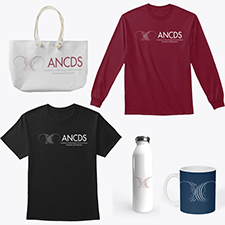
Show your ANCDS pride at your office, home, and everywhere you go with new ANCDS logo items! From coffee mugs to t-shirts, ANCDS merch makes for great gifts for colleagues, employees, friends, family, and yourself!
Start Shopping!
Contact Us
ANCDS
2345 Rice Street, Suite 220
St. Paul, MN 55113
Online: www.ancds.org
Email: [email protected]
Phone: 651-925-5528
Fax: 651-317-8048
Have feedback or suggestions for the newsletter? Contact us here!
|
President's Message
Dear ANCDS Members,
The rapid evolution of technology – especially artificial intelligence (AI) – is impossible to ignore. It dominates headlines and is increasingly part of our conversations about our clinical work and research. From tools that analyze speech and language samples to large language models that could assist with therapy planning and documentation, the potential to enhance clinical care is both real and exciting. On the research front, AI offers powerful new methods – from uncovering patterns in large datasets to generating hypotheses and developing models that can predict therapy outcomes or optimize treatment intensity.
At the same time, these advances raise important questions: How accurate and reliable are these tools? How do we guard against bias? What are the ethical implications? And, most importantly, how do we ensure that the use of technology aligns with our professional values and standards of care?
I’m thrilled that we’ll be digging deeper into some of these issues at the ANCDS Annual Scientific Meeting this November in Washington, DC. This year’s theme – Technological Advances and Ethical Decisions in Neurologic Communication Disorders – couldn’t be more timely. The Education and Standards Committee has developed a schedule of sessions that will examine how technological advances are shaping both clinical care and research in our field.
While I wouldn’t call myself a Luddite, I’ve rarely been the first to jump on new technologies. But this moment feels different – like a real inflection point in our field. I’m genuinely excited about the possibilities that various technology and tools like AI may hold for our clinical and research work in neurologic communication disorders. At the same time, as a curious skeptic, I’ve been trying to learn more – both about how these technologies work and where their limitations lie.
If you're interested in exploring some of these topics, I recommend a recent article by British philosopher Andy Clark titled "Extending Minds with Generative AI," published in Nature Communications. In it, he argues that it is human nature to build hybrid thinking systems that include non-biological resources – and that by recognizing this, we may rethink how we weigh the promises and threats of this new technological age.
I’ve also started reading Nexus: A Brief History of Information Networks from the Stone Age to AI by Yuval Noah Harari, which offers a historical perspective on how information technologies have continually reshaped human communication. I’m particularly interested in Harari’s argument that each major communication revolution – from the invention of writing to the internet – has not only expanded our capacity to share information but has fundamentally altered how we relate to one another. I’m not very far in yet, but it’s already got me thinking about how technology fits into our work and how it might help us fulfill the mission of ANCDS: to improve the communicative lives of people with neurologic communication disorders.
It’s an exciting moment to come together – not only to learn, but to lead. I hope to see you in November!
Warm regards,
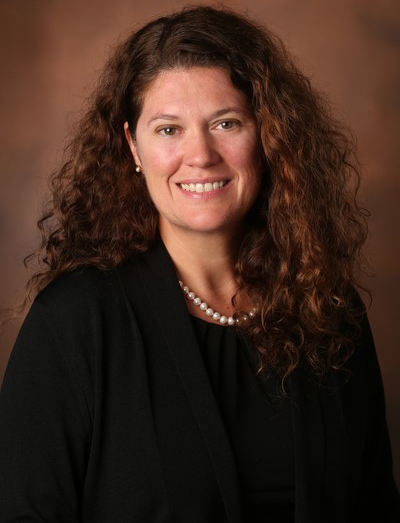
Melissa Duff, Ph.D., CCC-SLP
ANCDS President
[email protected]
In Memoriam: Dr. Roberta J. Elman
It is with great sadness that we announce the passing of our friend and colleague, Dr. Roberta J. Elman on May 29th, 2025. Dr. Elman was a long-standing member of ANCDS, with Board Certification since its inception in 1994. She served on numerous committees over the years including the Executive Committee, the Nominating Committee, the Honors Committee, the Meetings Committee, and the Certification Board. Dr. Elman received the Honors of ANCDS in 2020.
Dr. Elman provided extensive service to other professional and consumer organizations as well, including ASHA, CAC, Aphasia Access, the National Aphasia Association, and the Aphasia Hope Foundation. She received the Honors of ASHA in 2022 and the Audrey Holland Award for Distinguished Contribution to the Life Participation Approach to Aphasia at the Aphasia Access Leadership Summit in 2019. Dr. Nina Simmons-Mackie, in presenting this award, stated: “Her contributions have shaped a new generation of caring clinicians who grasp the broad principles of meaningful, socially relevant intervention for people with aphasia…her support and advice have been transformational.”
(Continue Reading)
ANCDS BRE Announces First Accredited Program
The mission of the ANCDS Board of Residency Education (BRE) is to assure quality and promote excellence through accreditation of residency programs in speech-language pathology that serve individuals with neurologic communication disorders. To achieve the mission, ANCDS BRE established standards for accreditation of a clinical speech-language pathology residency program in neurogenic communication disorders. Information about the BRE and these standards can be found on the ANCDS website.
The BRE is extremely pleased to announce that the Mayo Clinic (Minnesota) Medical Speech-Language Pathology Program is the first program accredited by BRE. Congratulations to the staff and leadership of this exemplary clinical training program on achieving this honor. The Mayo Clinic residency program is accredited from May 1, 2025 – April 30, 2030. As part of accreditation the program will submit annual reports to the BRE and apply for reaccreditation in 2029.
(Continue Reading)
Committee Updates
Education & Standards Committee
Annual Meeting
The ANCDS Annual Scientific Meeting entitled “Technological Advances and Ethical Decisions in Neurogenic Communication Disorders” will take place Wednesday, November 19th, in Washington, DC. Registration will open soon on the ANCDS website!
REDI Committee
ANCDS REDI Self-Study is back in 2025!
The ANCDS REDI Committee’s self-study course, Race, Equity, Diversity, & Inclusion Self-Study: Freedom of Discomfort, is now available for 2025 and can be ordered here.
This course is open to ANCDS Members and Non-Members, so feel free to share with colleagues and students! We encourage you to join the 12 members and non-members who have already signed up since enrollment re-opened in March. You’ll have until December 31, 2025 to submit your completed materials!
Testimonials:
“This was an eye-opening, well thought out educational endeavor for me. Thank you for the new path of learning and perspective.”
"I gained a deeper appreciation for the diverse perspectives and experiences that shape our society. The program's structured approach not only challenged my assumptions but also empowered me to take meaningful action towards fostering inclusivity and equity in both personal and professional spheres."
Communications Committee
ANCDS is seeking member-driven content for social media (Instagram, Facebook, and LinkedIn)!
Please send ANCDS-member-led or made CEU courses, manuscripts, invited speaker talks or webinars, or shareable resources to [email protected].
Boston Motor Speech Conference
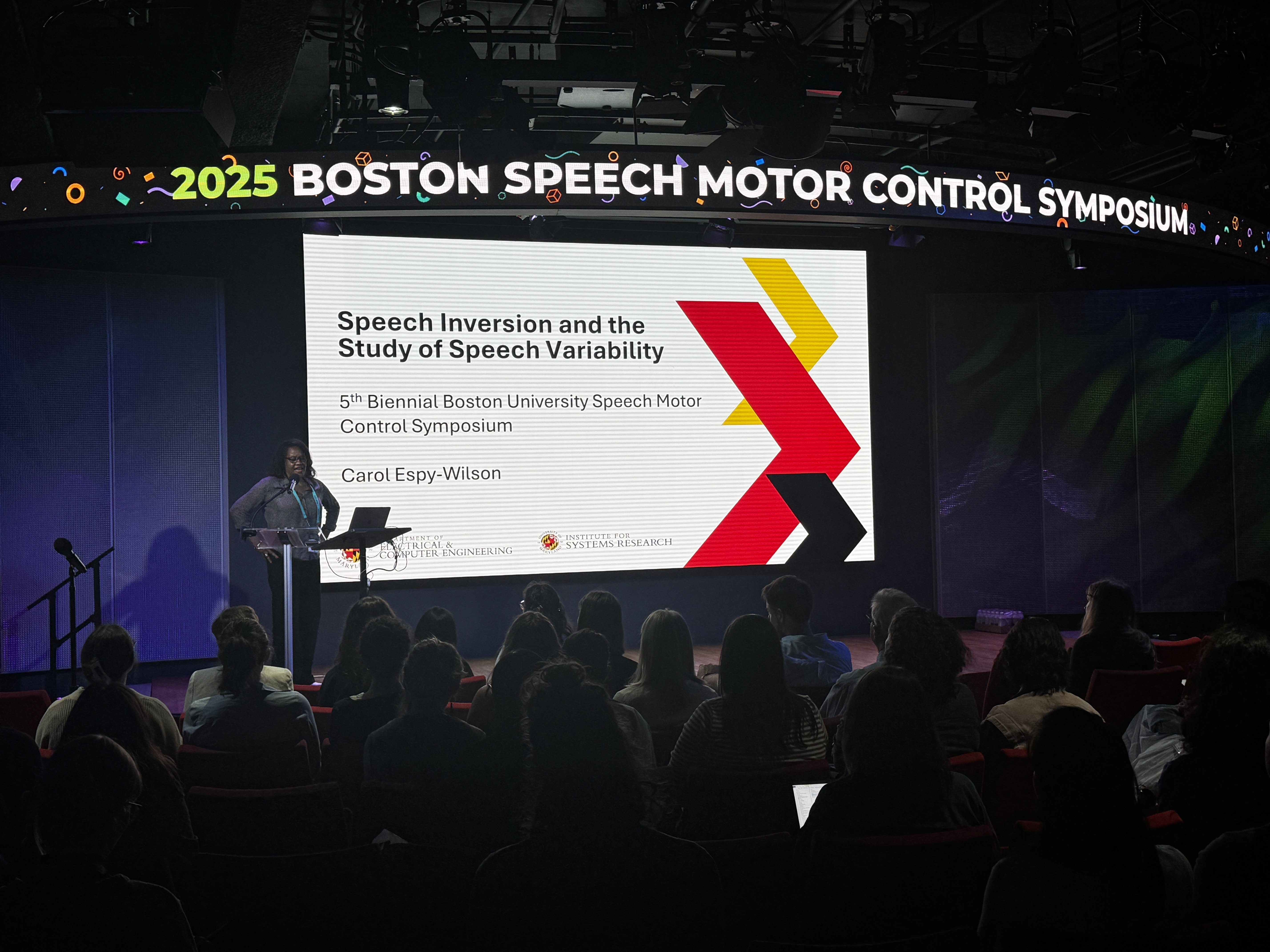
The 5th Biennial Boston Speech Motor Control Symposium brought together leading researchers, clinicians, and students at Boston University on June 12–13, 2025, for two days of groundbreaking presentations on speech motor control and neuromotor speech disorders.
Dr. Carol Espy-Wilson from the University of Maryland delivered the keynote address, showcasing her pioneering work in speech signal processing. As the first African-American woman to earn a Ph.D. in Electrical Engineering from MIT, Dr. Espy-Wilson presented research on speech inversion systems that can detect mental health conditions like depression and schizophrenia from speech patterns.
(Continue Reading)
2025 ASHA Awards Recipients
Please help us extend a huge congratulations to the ANCDS members who were recently recognized with these special ASHA Awards!
Honors of the Association
Barbara Shadden, Ph.D.
Lyn Turkstra, Ph.D., CCC-SLP
Gloriajean Wallace, Ph.D., CCC-SLP, BC-ANCDS
Fellowship of the Association
Nadine Martin, Ph.D.
Leanne Togher, Ph.D.
Rene Utianski, Ph.D., CCC-SLP, BC-ANCDS
Early Career Contributions in Research Award
Gabriela Meade, Ph.D.
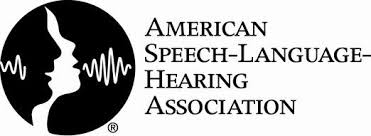
ASHA Announcements
NEW Evidence Map: ASHA’s Muscular Dystrophy Evidence Map provides summaries of synthesized research regarding screening, assessment, and treatment of swallowing and communication disorders in individuals with Muscular Dystrophy. Explore the Evidence Maps to see the impact speech-language pathology and audiology services can have for a variety of populations with neurologic communication disorders.
Demonstrate Your Value: ASHA’s Demonstrating Your Value fact sheets are printable PDFs that can be shared directly with administrators, payers, and other interested parties. These PDFs were designed to show how speech-language pathology and audiology services enhance care coordination, reduce costs, and improve client outcomes. Visit our library of fact sheets to explore data relevant to telepractice, Parkinson’s disease, acquired brain injury, and more. Want to suggest a new topic? Contact us at [email protected].
NOMS Data Snapshots and Interactive Reports: Did you know that adults with acquired brain injury who complete home programs as part of their outpatient treatment are three times more likely to have functional improvements in cognition? View and share this and other Data Snapshots from ASHA’s National Outcomes Measurement System (NOMS) data. Explore our Interactive Reports for an in-depth look at how SLP services improve clinical outcomes in individuals with neurologic communication disorders at a national scale. Interested in becoming a NOMS participant? Contact us at [email protected].
NEW Patient Safety and Quality Improvement Resources: Check out new and updated resources that highlight the speech-language pathologist’s role in promoting patient safety and participating in quality improvement (QI) efforts. Whether you're looking for tools to improve patient safety, real-world examples of QI initiatives, or guidance on workplace safety, these pages offer practical, actionable content developed with input from clinicians working in health care settings.
Patient Safety and the SLP
Tools for Improving Patient Safety
Workplace Safety for SLPs in Health Care
Examples of Quality Improvement Activities
Aphasia Access Announcements
Aphasia Access, a professional membership association, is a welcoming and needed antidote to the increasing obstacles today’s professionals face in healthcare, research, community, and academic environments. At Aphasia Access, you’ll find like-minded colleagues, resources, and evidence-based knowledge to practical “how to” solutions through the framework of the Life Participation Approach to Aphasia (LPAA).
Updates:
The Aphasia Access board revisited its mission and vision during recent strategic planning. Here are the outcomes.
- Mission: Aphasia Access empowers professionals and advocates across all settings to deliver person-centered services for people living with aphasia.
- Vision: Professionals and advocates are equipped to support people with aphasia to participate fully in life.
Aphasia Access Leadership Summit occurs every two years, bringing together aphasia clinicians, researchers, and advocates across numerous settings. This past April, 3-4 people gathered in Pittsburgh, PA for two days of featured talks, roundtable discussions, posters, resources, and networking. The dynamic energy, summed up by member Lauren Schwabish, M.S., CCC-SLP, is here.
Virtual Brag & Steal was hosted by the Resource Exchange Committee. These short, virtual presentations showcase ideas for implementing the life participation approach so attendees can “steal” it. June’s two-part program featured presenters with aphasia. Session one can be reviewed here and session two can be reviewed here.
Premier Continuing Education
Person-Centered Care: the LPAA Knowledge and Practice Courses offer a comprehensive road map for clinicians and students to obtain the knowledge, skill, and ability to implement LPAA in clinical practice – from concept through documentation and billing. These video, case-based modules offer the translation of clinical research to practical application.
The courses are available individually, to university classrooms (with special student pricing), and to professional groups as shared here by Jodi Morgan, M.S., CCC-SLP, with Brooks Rehabilitation Hospital.
Aphasia Access Conversations – Podcast Series:
This publicly available, free programming brings listeners current resources, tips, and valuable reflections from LPAA focused clinicians and researchers. New episodes include:
- Helping myself by helping other people … a conversation with Cindy “Yee” Lam-Walker (Episode 129)
- From Participant to Leader: Community Building in Aphasia Recovery … a conversation with Sherry Lovellette (Episode 128)
- Beyond the Plateau: Mindfulness in Aphasia Recovery … a conversation with Lori Gray (Episode 127)
- Collaborative Referencing with Dr. Suma Devanga … a conversation with Dr. Suma Devanga (Episode 126)
Valuable Resources:
- State of Aphasia: A Global Perspective – a one-stop, comprehensive report for anyone looking to set aphasia research, service priorities, or grab the attention of grant funders, policymakers, healthcare administration, and the media. Filled with the latest data on aphasia frequency, the demographic, clinical, and sociological aspects of aphasia care, populated with compelling stories of those living the experience.
- (LIV) Cards – evidence-informed tool kit that promotes client self-determination
- LPAA Focused Programs – listing for Persons with Aphasia and Care Partners
- … and much more available with an individual, group, or student membership.
Many members of the Aphasia Access family are mobilizing on exciting new avenues to achieve our mission and vision. If you’d like to explore a fit for your time and talents, reach out to Executive Director Tissy Greene at [email protected] or the leadership team.
Upcoming Meetings and Conferences
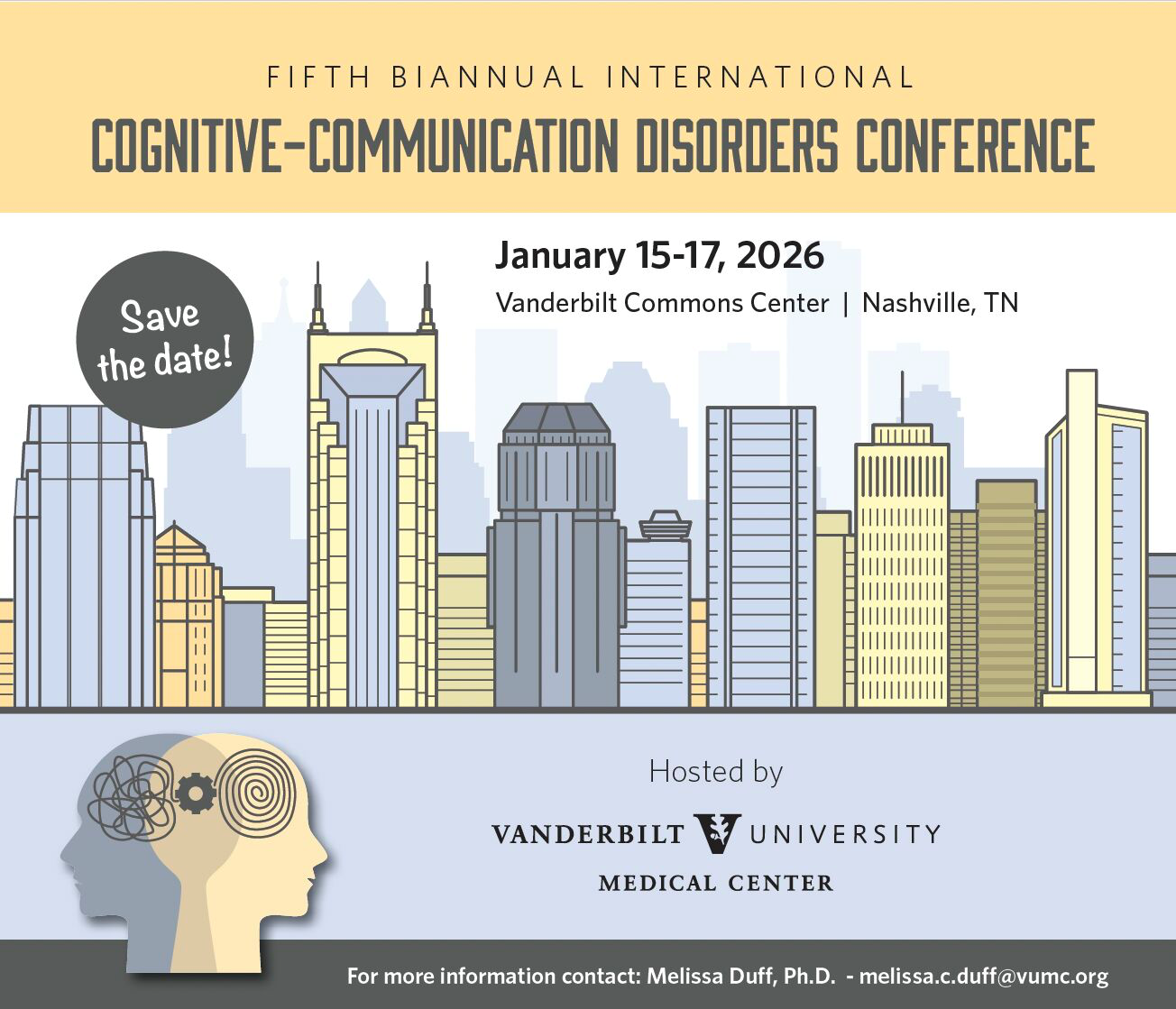
Member Accomplishments
Do you have exciting news, a recent publication, or know of an upcoming conference that you want to share with fellow members? Include it in the next ANCDS newsletter! Please submit items of interest using this online form.
Leora R. Cherney, PhD, CCC-SLP, BC-ANCDS, FACRM, was awarded the Audrey Holland Award at the 2025 Aphasia Access Leadership Summit, held in Pittsburgh PA, April 3-5. This award, the highest distinction of the organization, recognizes a member or organization for their outstanding contributions to the Life Participation Approach to Aphasia (LPAA) through clinical service, research, advocacy, leadership, and mentoring.
Melinda Corwin was named a Distinguished Fellow of the National Academies of Practice in 2025.
Dr. Jamila Minga was promoted to associate professor of surgery in the Department of Head and Neck Surgery & Communication Sciences and the Department of Neurology, Stroke, and Vascular Division at Duke University School of Medicine and the Department of Psychology and Neuroscience at Duke University.
With Elena Barbieri of Northwestern University's Feinberg School of Medicine, Maria Teresa Bonfatti Sabbioni of DePaul University, Rossella Raggi of Azienda Unità Sanitaria Locale di Piacenza, and Whitney Postman's Honors student and research assistant Reese Elledge now at Rush University's Department of Communication Disorders and Sciences, Whitney Postman of Worcester State University published an Italian version of the Quick Aphasia Battery, entitled "Test Rapido di Valutazione dell'Afasia". The three documents required to administer and score the Italian Quick Aphasia Battery – namely the scoresheet with complete administration instructions, stimulus card set, and Excel sheet with macros to facilitate scoring and severity rating – are freely available and downloadable through the webpage of Stephen Wilson's Language Neuroscience Laboratory at the University of Queensland in Australia: https://aphasialab.org/qab/.
The ANCDS Diversity Writing Group led by Gloriajean Wallace of Western Carolina University, with Gerald Imaezue of the University of South Florida, Anthony Kong of the University of Hong Kong, Taryn Malcolm of Hunter College, LaToya Roberts of Northeastern University in Charlotte, North Carolina, and Whitney Postman of Worcester State University, shall present a 1-hour oral seminar entitled "Scoping Evidence to Support Speech-Language Pathology Neurorehabilitation for People from Diverse Communities" at the 2025 ASHA Convention in Washington, D.C. on Thursday, November 20, 2025, from 10:30 to 11:30am (session number 1041).
Member Publications:
Braun, E. J. & Cherney, L. R. (2025). Small-Dose Behavioral Treatment Effects: Learning Following 2 Hours of Computer-Based Conversational Script Training in Individuals With Poststroke Aphasia. Journal of Speech Language Hearing Research. 68(3):1075-1091. DOI: 10.1044/2024_JSLHR-24-00326.
Saxon, M., Jackson, S., Seth, M., Koralnik, .I J., Cherney, L. R. (2025). Cognitive Rehabilitation Improved Self-Reported Cognitive Skills in Individuals With Long COVID: An Observational Study. Archives of Physical Medicine and Rehabilitation. DOI: 10.1016/j.apmr.2025.02.009.
Sorets TR, Finley JA, LaFrance WC Jr, Patten RV, Mordecai K, Jimenez M, Suchy S, Cahan J, Koralnik IJ, Cherney LR, Cotton E. Beyond mood screening: a pilot study of emotional, cognitive, and somatic concerns in patients with Long COVID. Front Psychol. 2025 Jun 17;16:1517299. doi: 10.3389/fpsyg.2025.1517299.
Dutta, M., Murray, L. L., Park, H., Burklow, E., Bose, A., Kim, H., ... & Casilio, M. (2025). Let’s Chat About Spoken Discourse: A Tutorial to Support Use of Spoken Discourse Analysis When Providing Aphasia Clinical Services. American Journal of Speech-Language Pathology, 1–36.
A Forum in ASHA Perspectives titled "Case Reports from the Board Certification Process of the Academy of Neurologic Communication Disorders and Sciences" was recently published in the April 2025 issue (Volume 10, issue 2). The Forum includes an Introduction written by Jacqueline Hinckley and Adithya Chandregowda, and peer-reviewed versions of four case reports that led to successful ANCDS Board Certification. The Introduction to the Forum argues for the value of case reports in clinical education and practice. The free access Introduction can be found here: https://pubs.asha.org/doi/10.1044/2025_PERSP-24-00299.
|